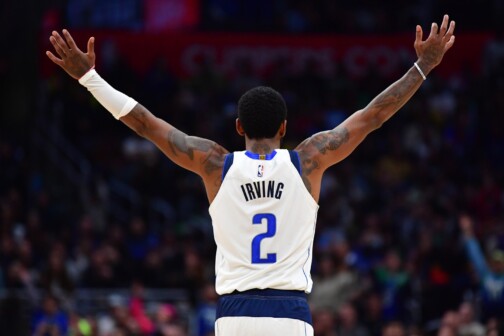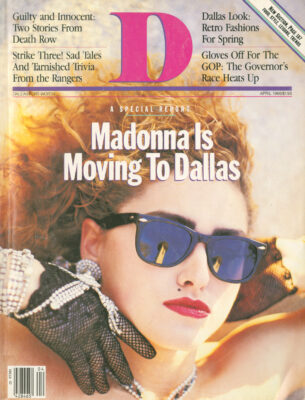Shelby Coffey III didn’t learn of the space shuttle Challenger disaster of January 28 until his plane from Denver touched down that Tuesday morning in Washington, D.C. When Coffey heard the news, though, he rushed to a ticket counter and demanded a seat on the first flight out to Dallas. As the man who would become editor of the Dallas Times Herald one month later, he dumped everything else from his schedule to watch his new team in action.
For the next few days, Coffey roamed the Times Herald newsroom, shaking hands with writers and editors as they scoured wire service reports and dug out chunks of fact with their telephones. He sat in on planning meetings, occasionally offering suggestions: Can we get more on the possible impact of the explosion on the NASA program? Do we have a comprehensive profile of teachernaut Christa McAuliffe? What about other teachers who applied for the flight? Coffey studied every story, photograph, and chart that appeared in the Times Herald and compared the product with the work of The Dallas Morning News and other daily papers. At the end of the week, Coffey declared himself impressed with the Times Herald’s, reporters and editors. In a pressure situation, they had acquitted themselves well.
Despite his praise-and it would hardly do for a new editor to find fault before he finds the men’s room-Coffey had reason to be worried about the newspaper he would begin leading in February. What are the biggest problems here? he asked various new associates and a few outsiders. How bad is newsroom morale, really? Why do so many people in this city seem to dislike the Dallas Times Herald?
Perhaps in four days of observation Coffey had discovered what has been apparent to local media watchers for some while now: the famous Dallas newspaper war is over. In case you haven’t heard, the Times Herald lost. In advertising, in circulation, in public image, and in the quality of the news product, the daily on Pacific Avenue, the one residents often refer to as “the other paper,” has fallen so far behind the rival Dallas Morning News that it no longer competes. Granted, no truce has been announced. But saying we still have a newspaper war in Dallas is like insisting we still have a war in Korea because no treaty was signed at P’anmunjom.
Exactly when the war ended is tough to say. Barbara Johnson, editor of Adweek magazine’s Southwest edition, estimates the cease-fire came roughly two years ago. Mike Levy, publisher of Texas Monthly and a self-anointed media critic, thinks he heard the last shots around the end of 1984. From my own experience, I’d place the end in April 1985. That’s when the Dallas Times Herald’s top soldier told me he had laid down his arms.
It was in the French Room of the Adolphus Hotel. Times Herald interim publisher Tom Johnson appeared frazzled and gray. His normally robust spirit seemed to have abandoned him. The boyish face, still nearly as youthful as when he was cadet commander of our Army ROTC unit at the University of Georgia twenty-odd years ago, was grimly set and haggard. He looked and sounded defeated. Over dinner and drinks, he gently chided me for misquoting him in an article. “I never say I think we can win” he insisted. “What I say is, I think we can survive,” It was sad to hear.
Looking at the Times Herald as Johnson did that evening, speaking of mere survival, may be unduly pessimistic. The paper earns modest profits-something in the neighborhood of $12 million in 1984-and it remains journalistically sound, if not robust. There’s no question, though, that the Herald faces a long and arduous period of rebuilding before it is again ready to take up arms and mount a war against the Morning News.
“Certainly, I would like to see us win someday,” Johnson says now. “But is that my short-term goal? No. My short-term goal is to rebuild.” Adds Johnson, the Los Angeles Times publisher who also oversees the Times Herald for the parent the two papers share, the Times Mirror Company, “I want to keep the focus on doing as well as possible at the Times Herald, but I don’t want to set unrealistic goals. To set a ’win’ strategy now would be unrealistic.”
To honcho the rebuilding process, Johnson has scrubbed out the executive suite and brought in a fresh group of managers. From publisher Art Wible, who arrived in September from the New York Daily News, on down, fresh faces occupy Times Herald offices. Only senior vice-president John Wolf, often listed among the most capable newspaper marketing talents in the country, remains of the contentious cadre that ran the paper two years ago.
Though Wible and Coffey are the most visible of the new recruits, from a practical standpoint the most important addition is a former Times Herald circulation director who was exiled by now-banished publisher Tom McCartin. Bill Powell led the Heraldlo some of its highest peaks in the shooting years of the newspaper war. For a short while, in fact, Powell peddled more Sunday papers than did the mighty Morning News. His departure from Dallas at the beginning of 1980 apparently resulted from a personality clash with McCartin, an executive renowned for personality conflicts.
By the time Johnson brought Powell back in December 1984, the paper was in a precipitous slide that made it no longer second, but a poor third, in the Metroplex. Current daily circulation of 231,000 is 5 percent below the Herald’s 1980 figure and 17,000 behind the Fort Worth Star-Telegram’s 248,000. With Monday through Saturday sales of 378,000, the Morning News is at least a couple of laps ahead of the pack. On Sundays, the Herald does lead the Startlegram, as journalists call the Fort Worth daily, but its 331,000 in sales hardly competes with the News, perched at a shade over a half million.
Part of the gap between the two Dallas dailies is due to an embarrassing bit of, uh, creative accounting discovered just before Bill Powell returned to Dallas. At the urging of the Morning News, the Audit Bureau of Circulations, the A.C. Nielsen of newspapers, checked Times Herald records and found the paper had credited itself with some 21,000 copies per day more than it sold. Powell’s first headache was untangling the books to keep his paper honest.
A bigger problem, though, was the simple fact that even people who really wanted to read the paper couldn’t get i(. The distribution system was a mess. Johnson once admitted that on one memorable Sunday in 1984, the Herald received some 30.000 complaints about delivery from a total Sunday circulation of less than 400,000.
Apparently, Powell has smoothed out this ugly wrinkle. Subscriber complaints reportedly have fallen to a manageable few hundred a day, though in some areas, would-be readers still carp about erratic delivery. Wible claims losses are staunched and predicts healthy sales increases by September.
Over the long term, the Herald still is stuck with its traditional place as the afternoon newspaper in Dallas. Despite an expensive circulation and marketing blitz to land the Herald on the driveway in the morning and the afternoon, it’s still seen as the afternoon paper. In Dallas, the afternoon problem is exacerbated by the practical difficulty of moving trucks up the Central Expressway parking lot in midafternoon to reach the growing markets of North Dallas. Morning papers face no such hurdle because their trucks roll about 3 a.m. Still, the Morning News recently opened a satellite printing plant in the northern suburbs. Meanwhile, some Times Herald genius ordered a $45 million expansion at the downtown plant. It will be interesting to see how Powell tackles this circulation bugbear. If I were a betting man, I’d wager the paper will convert entirely to morning delivery before the decade is out. Rebuilding may depend on it.
If Wible and Powell plug the circulation dike, the Times Herald’s other biggest problem, advertising, may partly solve itself. Advertisers tend to go where the readers are. But the Morning News took advantage of its victory in the newspaper war to solidify an already formidable position as the print medium in Dallas and North Texas. Currently, the News commands nearly 57 percent of the local advertising market, leaving the Herald a hair over 43 percent. If political reporters covered a newspaper war, they would call that margin a landslide.
RECOVERY OF circulation and advertising is, of course, critical to rebuilding the Dallas Times Herald. They provide the economic base upon which all else depends. However, the paper also must grapple with its own image. In this jingoistic city, the Herald, owned by a Los Angeles company, enters any competition with the home-grown Dallas Morning News at a handicap. But in the past few years, the Herald also has alienated friends and has generated open hostility from much of the business community. Wible and Coffey recognize that an energetic public relations campaign is essential to restore good will lost during the three-year tenure of former editor Will Jarrett.
By most accounts, Wible already has repaired some bridges to the business community. Observers like Bill Cooper, chairman emeritus of the Dallas Market Center, find him a good listener, more open and sympathetic to their pleas than other recent Times Herald executives. “Art has been showing himself and listening to people and talking,” says Cooper. “I am hopeful, and I think a lot of other people are hopeful, that we’ll be able to establish stronger relationships with the Times Herald under his leadership.”
Adds Dallas Chamber of Commerce President Forrest Smith, “You can’t deny that there was some hostility to the Times Herald within the business community. But Wible has made an amazing amount of progress in a very short time. I don’t think the paper is likely to change its basic philosophy, but I think it is more willing to give everybody a fair hearing.”
From what I have heard Johnson and Wible say, it is my guess that patching relations with business interests will be high on the new editor’s list of things to do, as well. There is speculation that Coffey was hired (from U.S. News & World Report at an annual salary reportedly approaching $300,000) largely because of his off-center good looks and quick smile. As a local ambassador, however, his success may depend on how quickly he grasps that business is the life-blood of Dallas in the same way that politics is the soul of Washington, where he spent most of his career with the Washington Post.
Black leaders, angered last year by what they regarded as racist columns by the pseudonymous Joe Bob Briggs and the subse-quent clumsy handling of their protests by Jarrett, give Wible high marks for his first six months in Dallas. As Coffey packed his i socks for the trip south, however, they remained suspicious that the paper’s public commitment to employing minorities and covering minority affairs is more form than substance.
“Technically, they have done what they ; said they would do after the Joe Bob Briggs incident,” says County Commissioner John . Wiley Price. “But we want to see what’s going to happen from now on.” Price concedes that seventeen minority hires in the past year put the Times Herald among the leaders in the nation in ethnic mix. Still, he complains that no minority journalists are among the editors making direct decisions about what is covered and how stories are written.
According to Price, Coffey’s advance reviews also were discouraging. Though he had not yet met Coffey, Price said recently that the Washington Post veteran was not well regarded by blacks. But a black columnist at the Washington Post, Courtland Milloy, offers a backhanded defense of Coffey. “You would hear that if you inquired about anyone in management at the Post, from editor Ben Bradlee on down. Minority concerns are not a priority at this newspaper.”
MY IMPRESSION, though gathered from a short interview during the week of the space shuttle disaster, is that Coffey is a brilliant listener and charming enough to disarm John Wiley Price and other detractors in short order. I suspect he’ll also have a salutary effect on the legendary miserable morale in the Times Herald newsroom.
In the rebuilding process, Coffey’s toughest job will be to shore up the sagging quality of the news product. He has only to compare his stiff’s efforts to the vastly superior work of the Morning News following the plane crash at D/FW Airport or the earthquake in Mexico City to discover the magnitude of the challenge. Several who knew him at the Washington Post wonder whether he will be equal to the job. They say he is a “soft-side” editor-good with feature stories, lifestyle sections, and such, but not respected for his handling of hard news.
Inside the Herald newsroom, staffers seem both tense and optimistic that the new boss will clean out news management and bring in his own editors, Those willing to bet-and no Herald staffer would do so on the record-speculate that Managing Editor Kerry Slagle and Associate Editor Roy Bode will be among the first to go.
Milking the Times Herald battle-ready again will keep Wible, Coffey. and the rest of the new executive team busy for a while. But as they redeploy their staff and resupply their troops, they also must keep close watch on the enemy. Levy of Texas Monthly believes the Morning News has grown so strong that a newspaper war no longer is possible in Dallas. According to Levy, Morning News President and Editor Burl Osborne may be the best newspaper editor anywhere. Osborne, Levy says, knows his industry, understands this city, and has a clear, specific vision of what the Morning News ought to be.
Certainly the Morning News has improved tremendously since Osborne took over in October 1980, but I think Levy may overstate the case. Though it clearly is the finest newspaper in Texas today, the Morning News rarely is listed among the best American newspapers. (Two papers owned by Times M irror Company, the Los Angeles Times and Newsday, consistently make the top ten.) Certainly, there is room for both Dallas papers to improve.
And that’s what’s sad about the end of the newspaper war. When the Times Herald was really in it. both papers battled to grow better. Now, though, the Times Herald struggles merely to cut its losses, which reportedly continued through the early months of this year The Morning News, meanwhile, sits smug and sassy, holding down expenses and monitoring the bottom line instead of charging full tilt toward excellence. Both papers seem to spend less, work less, and care less than they did in the early years of this decade, when the cannons were hot.
Art Wible believes his newspaper can get back in the contest. Now forty-eight, he plans to retire at sixty. Before then, he confidently expects to see the famous Dallas newspaper war raging once again. He shall return.
I hope he’s right. I’d like to see the Times Herald and the Morning News again butting heads in a battle to provide the most comprehensive, informative, and entertaining newspaper ever published in Dallas. The newspaper war was good for the city and fun while it lasted. I miss it.
Related Articles

Hockey
The Stars and Golden Knights Meet Again
Catching the Stanley Cup champs early might work out for the Stars.
By Sean Shapiro

Basketball
Previewing Yet Another Mavs-Clippers Playoff Matchup
What is different about Clippers-Mavericks this time around? Kyrie and D.
By Iztok Franko

Restaurant Openings and Closings
Try the Whole Roast Pig at This Mexico City-Inspired New Taco Spot
Its founders may have a fine-dining pedigree working for Julian Barsotti, but Tacos El Metro is a casual spot with tacos, tortas, and killer beans.


